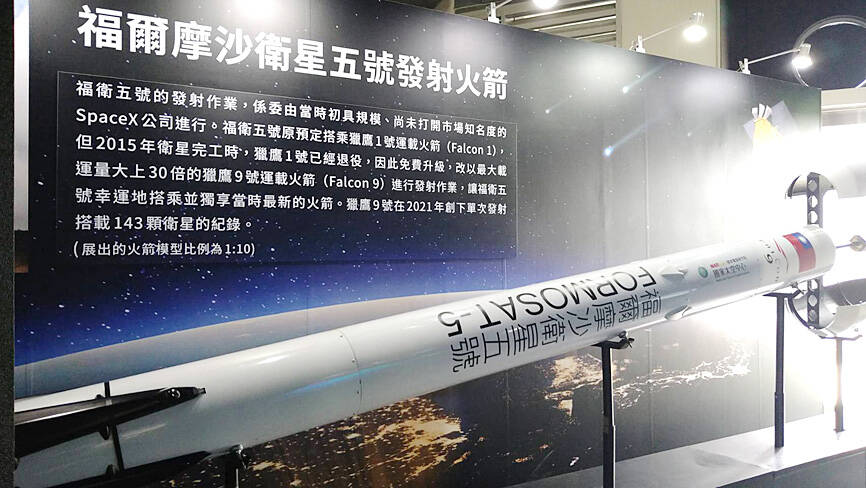Formosat-5, the nation’s first domestically developed remote-sensing satellite, has taken more than 60,000 images since it was launched five years ago, the National Science and Technology Council said on the anniversary of its launch on Thursday.
The satellite was launched on Aug. 25, 2017, from Vandenberg Air Force Base in California by SpaceX’s Falcon 9 rocket, and began commercial operations on Sept. 21, 2018.
Since then, it has taken more than 60,000 images with a success rate of 94.87 percent, council data showed.

Photo: CNA
Formosat-5 not only established Taiwan as a capable developer of satellites and optical parts, but also helps with disaster response around the world, council Minister Wu Tsung-tsong (吳政忠) said.
In the past five years, it has provided images of areas affected by 19 domestic and 101 international disasters, council data showed.
These include major events such as the July 2019 Ridgecrest earthquakes in southern California, flooding in Kaohsiung on Aug. 6 last year and the Hunga Tonga-Hunga Ha’apai volcanic eruption in the South Pacific in January, the council said.
Through the images, countries could grasp a better understanding of the respective situation on the ground, it said.
Large-scale wind events, weather and other factors can affect the operation of reconnaissance aircraft, but satellite images can be taken immediately, the National Space Organization (NSPO) said.
The satellite also helps governments, industry and academics with ecological monitoring, Wu said.
For instance, Formosat-5 has helped countries in Central America fight Panama disease, which poses a serious threat to banana crops, the council said.
As the banana industry is crucial for diplomatic allies Guatemala, Honduras and Belize, they sought assistance from Taiwan to fight the fungus-caused disease, it said.
Researchers developed a program that can automatically identify affected areas through regular images taken by Formosat-5, enabling farmers to quickly remove threatened plants and stymie the spread, it added.
Formosat-5 set a milestone for Taiwanese space technology, the council said.
Third-party manufacturers involved in the satellite’s production have achieved the highest level of NASA’s nine-tiered technology readiness system, granting the industry a firm foothold in international markets, it added.
Formosat-5 is still in good condition, even though it has reached the end of its expected lifespan, the NSPO said.
For now, it is to remain in operation, with plans to experiment with other functions to gather data for future satellite design and maintenance, it added.

Chinese Nationalist Party (KMT) Chairman Eric Chu (朱立倫), spokeswoman Yang Chih-yu (楊智伃) and Legislator Hsieh Lung-chieh (謝龍介) would be summoned by police for questioning for leading an illegal assembly on Thursday evening last week, Minister of the Interior Liu Shyh-fang (劉世芳) said today. The three KMT officials led an assembly outside the Taipei City Prosecutors’ Office, a restricted area where public assembly is not allowed, protesting the questioning of several KMT staff and searches of KMT headquarters and offices in a recall petition forgery case. Chu, Yang and Hsieh are all suspected of contravening the Assembly and Parade Act (集會遊行法) by holding

PRAISE: Japanese visitor Takashi Kubota said the Taiwanese temple architecture images showcased in the AI Art Gallery were the most impressive displays he saw Taiwan does not have an official pavilion at the World Expo in Osaka, Japan, because of its diplomatic predicament, but the government-backed Tech World pavilion is drawing interest with its unique recreations of works by Taiwanese artists. The pavilion features an artificial intelligence (AI)-based art gallery showcasing works of famous Taiwanese artists from the Japanese colonial period using innovative technologies. Among its main simulated displays are Eastern gouache paintings by Chen Chin (陳進), Lin Yu-shan (林玉山) and Kuo Hsueh-hu (郭雪湖), who were the three young Taiwanese painters selected for the East Asian Painting exhibition in 1927. Gouache is a water-based

Taiwan would welcome the return of Honduras as a diplomatic ally if its next president decides to make such a move, Minister of Foreign Affairs Lin Chia-lung (林佳龍) said yesterday. “Of course, we would welcome Honduras if they want to restore diplomatic ties with Taiwan after their elections,” Lin said at a meeting of the legislature’s Foreign Affairs and National Defense Committee, when asked to comment on statements made by two of the three Honduran presidential candidates during the presidential campaign in the Central American country. Taiwan is paying close attention to the region as a whole in the wake of a

OFF-TARGET: More than 30,000 participants were expected to take part in the Games next month, but only 6,550 foreign and 19,400 Taiwanese athletes have registered Taipei city councilors yesterday blasted the organizers of next month’s World Masters Games over sudden timetable and venue changes, which they said have caused thousands of participants to back out of the international sporting event, among other organizational issues. They also cited visa delays and political interference by China as reasons many foreign athletes are requesting refunds for the event, to be held from May 17 to 30. Jointly organized by the Taipei and New Taipei City governments, the games have been rocked by numerous controversies since preparations began in 2020. Taipei City Councilor Lin Yen-feng (林延鳳) said yesterday that new measures by